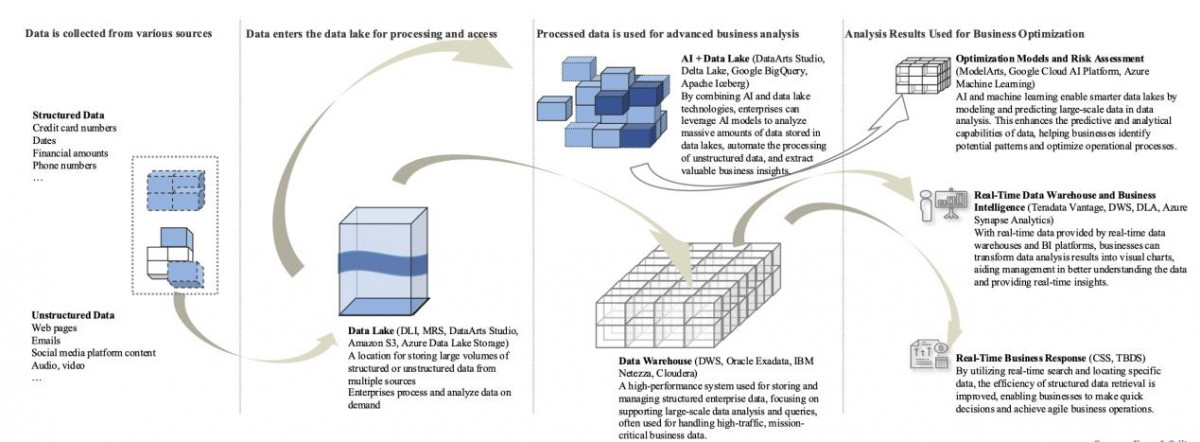The Asia-Pacific Region is Pioneering Industry Change with the Influence of Big Data
In Brief
The integration of big data across various sectors in the Asia-Pacific is revolutionizing finance, government, and telecommunications. It enhances operational efficiency, offers personalized experiences, and strengthens risk management frameworks, showcasing its vast technological and economic impact.

The deployment of big data solutions across various industries is fueling a transformative wave in the rapidly evolving Asia-Pacific region. Focusing on critical sectors like finance, government, and telecommunications, big data solutions are driving operational improvements, tailored user experiences, and effective risk management. These transformations illustrate how big data is reshaping the tech and economic landscape of the region.
An Overview of the Big Data Ecosystem
The big data landscape in the emerging Asia-Pacific region encompasses an entire ecosystem, from data gathering and storage to analysis and application. This complex infrastructure allows companies to tap into extensive data collections and extract actionable insights. Key components of this ecosystem include data lakes, data warehouses, and advanced data architectures.
As sectors such as banking and telecommunications shift towards digital frameworks, this whole ecosystem flourishes. The rapid surge in digital communications and e-commerce has elevated the demand for big data platforms. Companies are adopting these platforms to combine both software and hardware solutions, ensuring seamless analysis and insight generation that ultimately enhances their decision-making capabilities.
Accelerating Digital Transformation with Big Data
The rise in demand for big data solutions is closely tied to the Asia-Pacific's shift towards a digital economy. Both businesses and government entities are increasingly leveraging big data analytics to tackle urgent challenges and enhance their offerings. For instance, financial institutions utilize these insights to combat fraud, refine risk management practices, and provide customized service experiences. Banks in Singapore and Malaysia, for example, rely on advanced analytics to forecast market behaviors and refine their products.

The telecommunications sector is also experiencing significant advancements thanks to big data. In Indonesia, service providers analyze consumer behavior patterns to tailor their services and enhance network quality. Similarly, government initiatives in Malaysia and Thailand are focusing on smart city projects, harnessing big data to improve public safety, urban planning, and traffic management.
While big data holds incredible promise, it also presents certain challenges. Issues like fragmented data, delays in real-time analytics, and security vulnerabilities demand sophisticated solutions. Consequently, investments in technologies capable of addressing these challenges have risen, ensuring more efficient operations and boosting overall productivity.
The Evolution of Intelligent Data and Real-Time Data Processing
Real-time data processing is increasingly becoming a pivotal technology that enables companies to adapt and respond quickly. Industries ranging from retail and manufacturing to finance are tapping into these capabilities to enhance customer experiences, mitigate risks, and optimize decision-making processes. The fusion of intelligent data lakes and real-time computing allows for accurate and efficient analytics.
Intelligent data lakes are also critical in minimizing operational hurdles. By delivering robust analytics and dynamic scaling, these solutions streamline resource management, particularly for industries dealing with massive datasets. The integration of edge computing with intelligent data lakes has further amplified data processing capabilities, leading to quicker insights and optimized resource utilization across sectors like logistics and smart cities powered by IoT.
Criteria for Evaluating Big Data Service Providers
Big data service providers are assessed based on their performance in three key domains: customer service quality, technological innovation, and market relevance. These criteria ensure that organizations receive solutions tailored to both their operational and compliance needs.
Market relevance examines a provider's ability to meet specific industry requirements. Companies like Huawei Cloud and AWS excel in serving diverse sectors, including banking and telecommunications, across multiple regions, delivering solutions that cater to local demands.
The focus of technological innovation is on the providers' expertise in areas like intelligent data lakes, elastic scalability, and AI integration. Vendors that demonstrate superior real-time processing and fault tolerance capabilities are particularly valued, as these features significantly enhance analytics accuracy and support crucial decision-making.
Customer service is gauged by the providers' ability to localize and customize their solutions. Higher evaluations are awarded to those who offer strong security, compliance, and risk management features. This focus ensures organizations can seamlessly implement big data technologies while maintaining data integrity and adhering to regional regulations.
Major Players in the Big Data Landscape: Huawei Cloud and Others
Leading the big data industry in the emerging Asia-Pacific region are Huawei Cloud, AWS, Microsoft Azure, Google Cloud, and Alibaba Cloud. These providers are at the forefront of innovation, offering advanced solutions that address the evolving needs of businesses.

Huawei Cloud, in particular, has made significant strides in markets like Bangladesh, Thailand, and Hong Kong. Its expertise in intelligent data lakes and real-time analytics has empowered organizations to enhance decision-making processes and optimize their operations. Moreover, its commitment to regulatory compliance and data security solidifies its status as a favored partner for enterprises.
In Singapore, AWS stands out as a market leader, with its extensive support services and cloud capabilities enabling businesses to thrive and innovate. Likewise, Microsoft Azure aids companies in Malaysia and Thailand in their digital transformation journeys through its AI-powered analytics.
Other market competitors, including IBM, Cloudera, and Databricks, are making significant moves to expand their presence and enhance their technological capabilities to meet consumer requirements. Experts like Teradata and Oracle are well-regarded for their enterprise-grade expertise in crafting bespoke solutions that address specific business needs.
The Promising Outlook for Big Data in the Evolving Asia-Pacific Region
The big data market in the developing Asia-Pacific region is poised for continual growth. As organizations press forward with their digital transformation strategies, the demand for sophisticated data solutions is only expected to escalate. Providers such as Microsoft Azure, AWS, and Huawei Cloud are set to be at the vanguard of this growth, advancing technologies and adding substantial value for businesses.
By leveraging AI integration, intelligent data lakes, and real-time analytics, organizations can enhance operational efficiency and respond effectively to the demands of dynamic markets. As sectors evolve, big data technologies will increasingly play a crucial role in shaping their trajectories, enabling businesses to remain agile and competitive in an ever-changing digital marketplace.
Disclaimer
In line with the Trust Project guidelines Please be aware that the information provided on this page is not intended as legal, tax, investment, financial, or any other form of advice. It's crucial to only invest what you can afford to lose and seek independent financial counsel if you're uncertain. For more details, we recommend reviewing the terms and conditions along with the help and support pages provided by the issuer or advertiser. MetaversePost is dedicated to delivering accurate, impartial reporting, though market conditions can shift without notice.







